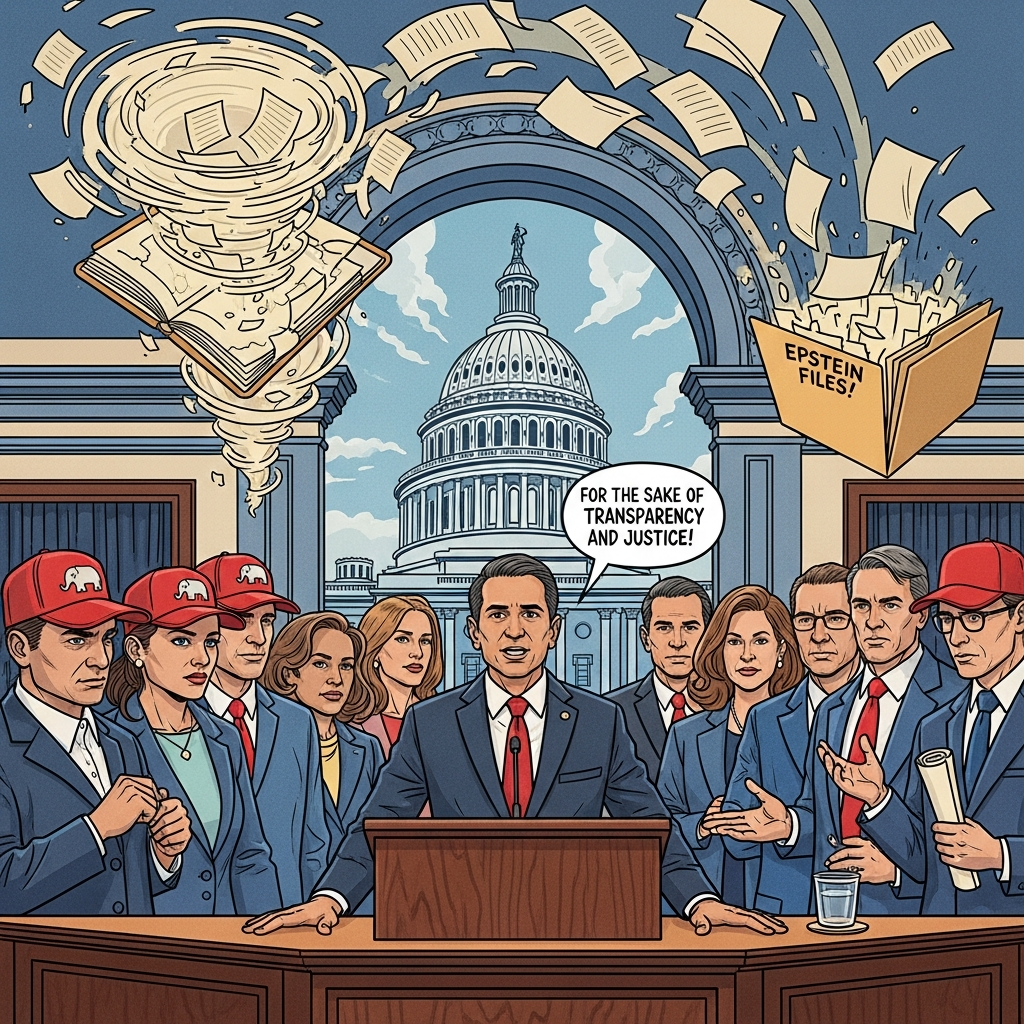In a surprising political maneuver, Representative Ro Khanna, a Democrat from California, has engineered a rare bipartisan victory, effectively uniting disparate factions, including elements of the “Make America Great Again” (MAGA) coalition, behind the critical effort to release the Jeffrey Epstein files. This legislative triumph, which mandates the Justice Department to disclose all records related to the disgraced financier and convicted sex offender within 30 days, showcases Khanna’s unique political strategy and hints at a potential populist vision capable of bridging America’s deep political divides. For many, this marks a significant shift, demonstrating that certain issues can transcend partisan loyalty, even within the highly polarized landscape of Washington.
A Breakthrough for Transparency: The Epstein Files Act
The passage of the Epstein Files Transparency Act represents a monumental step toward accountability and public trust. Spearheaded by Rep. Ro Khanna, 49, alongside Kentucky Republican Rep. Thomas Massie, the bill was introduced in July. Their concerted efforts created an unlikely alliance, attracting a diverse group of Republican co-sponsors. This coalition notably included prominent MAGA figures such as Georgia’s Marjorie Taylor Greene, South Carolina’s Nancy Mace, and Colorado’s Lauren Boebert. Such broad, cross-party support allowed the bill to bypass traditional House GOP leadership and force a vote.
The momentum for transparency built steadily, even challenging former President Donald Trump. Initially, Trump pushed for months to dissuade Republicans from joining the effort. However, facing growing inevitability and the potent public sentiment surrounding the Epstein case, Trump ultimately reversed his stance, lending his backing to the measure in its final days. Party leaders quickly followed suit. The bill then passed the House with near-unanimous support, with only one Republican dissenting, before moving to a unanimous vote in the Senate. This legislative journey underscores the profound impact of the Epstein files transparency movement across the political spectrum.
The Unlikely Cracks in the MAGA Coalition
Khanna’s success in “cracking the MAGA coalition” on the Epstein files issue is particularly noteworthy. The external research highlights that the Epstein controversy proved uniquely salient for many Americans, defying political experts who often underestimated its importance. Public dissatisfaction, especially concerning economic issues, had already begun to weaken Trump’s standing. His administration’s initial refusal to release the Epstein documents, coupled with evolving excuses, intensified accusations of a cover-up among a segment of his base.
This situation fostered the emergence of “rebel Republicans” within the House caucus. Figures like Reps. Massie, Greene, Mace, and Boebert publicly defied Trump’s pressure. They signed a discharge petition alongside Democrats, driven by a commitment to justice for Epstein’s victims. This resistance signals a potential re-emergence of independent Republican voices, a phenomenon largely suppressed during Trump’s previous presidency. For these “rebel Republicans,” the call for Epstein files transparency resonated deeply with populist, anti-establishment sentiments, allowing them to champion constituent interests even if it meant diverging from the party line.
Ro Khanna’s Vision: Economic Patriotism and Anti-Elite Populism
For Rep. Ro Khanna, this legislative achievement is more than just a single victory; it’s a foundational element of a broader national political vision. He describes his approach as building blocks for a populist movement that can “unite the left and right.” Khanna envisions an “enduring coalition” centered on “new economic patriotism.” This concept involves a shared critique of what he terms “the Epstein class” – an elite governing class perceived as accumulating power, operating with impunity, and creating a system that fails ordinary Americans.
Khanna advocates for prioritizing the economic independence and success of “forgotten Americans” over the interests of a “billionaire elite.” He draws inspiration from President Franklin Delano Roosevelt, channeling a similar desire to challenge wealthy interests. This focus on anti-elite sentiment and economic justice acts as a powerful bridge, appealing to both progressive Democrats and populist Republicans who feel disenfranchised by the established order. By framing the Epstein files release as a stand against a corrupt elite, Khanna tapped into a potent vein of public frustration shared by diverse voter groups.
A Distinct Approach to Bipartisanship
Khanna’s political approach is remarkably distinct among contemporary Democrats. Unlike some of his colleagues, who might rely on fiery rhetoric or traditional progressive imagery, Khanna consciously seeks partnerships with MAGA Republicans. He openly acknowledges that this willingness to collaborate with figures often criticized by liberals can draw flak from within his own party. However, he sees it as crucial for building trust and achieving tangible legislative outcomes.
His strategy involves “being civil to colleagues,” giving credit to Republican partners, engaging with “Republican-leaning podcasts,” and “treating MAGA voters with respect.” Khanna makes a point of avoiding partisan “Twitter wars,” contrasting his style with others. Rep. Thomas Massie confirmed Khanna’s instrumental role, praising his ability to “put aside the partisan bomb throwing.” Khanna’s focus on the human element and the shared goal of justice for survivors ensured the Epstein bill remained above partisan squabbling. He stressed that making it about the victims, rather than political point-scoring, was key to securing bipartisan success.
The Broader Political Implications
The success of the Epstein Files Transparency Act, driven by Khanna’s unique strategy, carries significant implications for American politics. It demonstrates that highly charged social justice issues, when framed as battles against an entrenched elite, can forge powerful, cross-ideological alliances. This could reshape how Democrats approach issues traditionally viewed as partisan, opening new avenues for legislative progress.
The episode also highlights evolving dynamics within the Republican party, particularly the MAGA movement. While the New Yorker article suggests that “MAGA civil wars” are often overhyped and Trump typically consolidates loyalty, the Epstein files presented a unique challenge. Trump’s initial stonewalling contradicted the “America First” movement’s anti-establishment core, risking disillusionment among some of the “newer people” he brought into politics, such as podcast listeners and independent voters who value authenticity. His eventual pivot suggests he recognized the political imperative to align with a populist demand for transparency.
Beyond the Epstein bill, Khanna has a track record of bipartisan collaboration on populist issues. He teamed up with Rep. Don Bacon (R-Neb.) to repeal Trump’s coffee tariffs and worked with other Republicans on congressional term limits and reining in warrantless surveillance powers under FISA Section 702. While early polls suggest Khanna would be an underdog in a White House bid, his consistent demonstration of uniting diverse political factions on issues challenging the establishment offers a fresh blueprint for future national campaigns. This approach, he believes, has a better chance of engaging a broader electorate than traditional partisan appeals.
Frequently Asked Questions
What is the significance of the Epstein Files Transparency Act?
The Epstein Files Transparency Act, spearheaded by Rep. Ro Khanna and Rep. Thomas Massie, mandates the Justice Department to release all records related to Jeffrey Epstein within 30 days. This act is significant because it represents a rare bipartisan legislative victory, showcasing a united front across the political spectrum for accountability and transparency regarding a powerful, convicted sex offender. Its passage signals a profound public demand for justice and an erosion of perceived impunity among elite figures.
How did Ro Khanna achieve bipartisan support, including from MAGA Republicans, for the Epstein files release?
Ro Khanna achieved bipartisan support by employing a unique political strategy focused on civility, building trust, and framing the issue as a fight against an “elite governing class” rather than a partisan attack. He actively partnered with hard-right Republicans like Thomas Massie, Marjorie Taylor Greene, and Lauren Boebert, prioritizing the shared goal of justice for survivors over political differences. By engaging respectfully with diverse groups and avoiding “Twitter wars,” Khanna fostered an environment where figures from the MAGA coalition felt comfortable defying party lines to support the transparency initiative.
What is Ro Khanna’s broader political vision, and how does the Epstein files effort fit into it?
Rep. Ro Khanna’s broader political vision revolves around building an “enduring coalition” based on “new economic patriotism” that can unite the left and right. He aims to rail against an “elite governing class” that he believes has created a system failing ordinary Americans, advocating for economic independence and success for “forgotten Americans” over a “billionaire elite.” The Epstein files effort fits perfectly into this vision, serving as a concrete example of challenging powerful interests and holding “the Epstein class” accountable, thereby demonstrating his commitment to fighting for ordinary citizens across partisan divides.
Moving Forward: A New Political Blueprint?
The successful passage of the Epstein Files Transparency Act, largely attributed to Rep. Ro Khanna’s unconventional political strategy, marks a fascinating moment in American politics. It demonstrates that while partisan divides run deep, specific issues—especially those touching on public trust, accountability, and anti-elite sentiment—can compel surprising alliances. Khanna’s ability to unite elements of the MAGA coalition and the progressive left around the demand for Epstein files transparency offers a potential blueprint for addressing other complex challenges. His ongoing exploration of a White House bid suggests that this “new economic patriotism” and unique approach to bipartisanship might be tested on a much larger scale in the years to come, potentially reshaping the future of American political discourse.



